March 2021: Olive Tree

Volume V/Issue 12/March 2021


From The Editorial Desk
HAVE YOU EVER WALKED ON WATER?
Some people never cease to amaze me. They love to point out failure (or what they have heard or read about) in another's life, especially one who has done good works for the Lord.
This morning I was reading about Peter walking on water and I thought to myself, "Why did he take his eyes off of Jesus?" Then a question came into my mind that kicked me right in my conscience, "Have you ever walked on water?" I thought about it for about two seconds and answered, "Well, no!" That voice in my head seemed to say, "Well then, why are you rebuking Peter when he at least had enough faith to fail."
Then, I had a thought that absolutely floored me. Most people never sink because they never even try. Failure is criticized while a lack of ever stepping out on faith is accepted. No other disciple in that boat sank, but then again no one else stepped out in faith and tried. Peter did. Peter was not a risk taker. He was a faith taker, but like all of us who step out we often look down at our feet and start to sink. BUT sinking is not all that bad.
Two marvelous things happened when Peter began to sink.
"...and he cried, saying, Lord, save me." No one else was sinking so no one else felt that total helplessness that caused Peter to cry out to Jesus. Our failures do for us what our never trying could not do. They make us cry out to the Lord. I called out to the Lord in my sinking far more than when I was in the boat.
"...and immediately Jesus stretched forth his hand, and caught him." Now if you have never been caught by Jesus, YOU'VE NEVER BEEN CAUGHT. Peter was closer to Jesus in his failure than those who never stepped out on the water. I'm in his arms. I'm the younger son who has felt the kisses of my father on my grimy neck. I personally picture Jesus still afar off from Peter. I see him reaching forth his hand and suddenly he was right there just like the father with the Prodigal. Jesus is never far away from us when we are sinking. He is just a cry away.
I sank. I tried to walk on water but I let the temptations cause me to take my eyes off Jesus. I lost my faith and I began to sink. I tried to swim but the waves of guilt and shame were too great. I did all I could do. I cried out to the Lord and the instant I did.......Jesus reached out his arm and caught me.
For those who stepped out of the boat and walked a few steps in service, but then through sin, fear or discouragement began to sink...you're gonna be fine. Just cry out to Jesus and be ready for him to catch you.

Sin Is the Only Evil Which We Ought to Hate

We call many things in the world evils, because they go against our own desires and the way we things should go to make our lives easier. It is difficult for us to think of our house catching on fire as something good, because of the destruction of our property and the disruption of our lives. But, let us consider what might have happened if our house had not burned down. What sins were we indulging in our house?
In fact, let us consider the evil of sin. Saint John Eudes says: "It would be most just, if God were to punish a single sin by stripping us of life and of all the temporal and spiritual graces which He has given us, letting fall upon us every kind of punishment." Consider how evil sin must be to merit such a punishment! And Saint John did not say mortal sin, but any sin. We measure an offense by the dignity of the person offended. Since God's dignity is infinite, the offense of sin is infinite.
Let us return to Saint John Eudes: "I say, furthermore, that, according to all theologians, the extinction of every natural being is not so great an evil as a venial sin. So he who commits a venial sin works an evil greater than the destruction of the whole world; consequently God might justly destroy the whole world in punishment for a venial sin." One venial sin is a worse evil than the destruction of the world. Do we think like this?
If we truly believed sin is evil, we would work hard on removing sin from our lives. There are two kinds of sin, deliberate and in-deliberate sins. We know that all mortal sins are deliberate sins, because that is one of the requirements. All in-deliberate sins are venial sins, even the matter happens to be serious. The difference between a mortal sin and a deliberate venial sin is the seriousness of the matter. All venial sin is evil, but a lighter matter in that it is not punished with eternal damnation as it could be if God had so willed.
Our problem with our attitude towards sin is considering venial sins small, when in fact they are still an infinite offense against God. Rather than draw the line between good and evil, sin being the evil, we draw a line between levels of evil and tolerate small evils in our life, that is our pet venial sins. Tolerating a small evil in our life is liking taking in a lion cub and letting it grow up in our house. Some day he will be big enough to eat us.
"He that contemneth small things, shall fall by little and little." (Ecclesiasticus 19:1) When we deliberately sin, we become weaker. Let us consider mortal sin as a fast acting poison that will kill us instantly, while venial sin is a slow acting poison that weakens our system. When we weaken our heart and soul by deliberate venial sin we prepare ourselves for a major fall. When the temptation to sin mortally comes we are far more likely to commit mortal sin, than if we had been living a life of virtue and asking God to remove all sin from our lives.
The holy Cure of Ars, Saint John Vianney tells us: "pride produces every sin." Deliberate sin flows from our pride. I deserve to indulge myself, because... If they would not do …, I would have no reason to get angry. Then we always have a good reason to do so. Sin has a number or reasons used to excuse it. These are called rationalizations, because we create reasons to excuse our sin or at least to minimize it. When we begin this habit to minimize.
Pride is at the root of our sins, especially those we proudly commit. When I choose sin, I am also proud. Humility desires to get as far away from sin as possible.
Saint John Vianney says that pride is an untrue opinion of what we are not. How many of us think of ourselves as paragons of virtue. And yet, when we honestly walk into the confessional we will see that we have many small vices. The problem is that vice is like cancer that will grow until it kills us, if not checked and removed. Someone I know recently had cancer surgery. The oncologist has declared her cancer free, but still wants to see her regularly to make sure she stays that way. This is why we make our daily examination of conscience every evening. This is why we have a regular time to confess, if possible. We need to make sure we keep free from the cancer of sin.Saint Thomas Aquinas writes: "Contrition is a sorrow for sin, because it is an offense against the divine goodness. Theologians say that contrition is a formal act of perfect love of God; for he who has contrition, is moved by the love which he bears to the goodness of God to repent of having offended Him. Hence, to make an act of the love of God, saying, My God, because you are infinite goodness, I love you above all things; and, because I love you, I am sorry above all things for having offended You, will greatly assist the soul to make an act of contrition." Contrition is also known to us as the perfect act of Contrition the act of imperfect contrition being known as attrition, which is sufficient in the Confessional.
If we sin mortally, we should immediately repent and make a Perfect Act of Contrition. Saying some set prayer may help, but the contrition must come from the heart. Let the heart speak freely to God, telling Him how much we are sorry for having offended Him. Let us learn how serious sin is and ask God to keep us from sin. He will help us work with Him to eliminate sin from our lives. Let us remember God wants sin out of our lives: "Be you therefore perfect, as also your heavenly Father is perfect." (Matthew 5:48) The perfect do not sin. But this is impossible, you may think. "And Jesus beholding, said to them: With men this is impossible: but with God all things are possible." (Matthew 19:26
We are called to perfection, therefore we are called to step away from all sin and ask God to remove sin from our lives. Let us remember that the only evil in the world is sin.

The Virtue of Courage


Our Own Way of the Cross
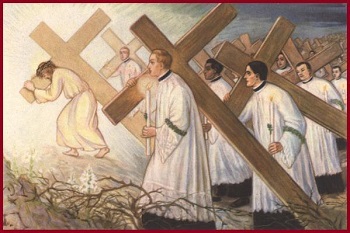
Three conditions are here set by Christ for those who are willing to follow Him. The first - let him deny himself. The second - take up his cross. And the third - follow Me. Let us look at each of these conditions in their turn.
First: “Let him deny himself.” What is meant when our Lord says we must deny ourselves?
This means quite simply that as Christians, we decide for the sake of Christ and for the confession of the true faith, not to run after all the benefits of this world, but rather to endure all difficulties, trials, and misfortunes firmly and unshakably; all for Christ's sake.
In order to fulfill the call of the Lord when He says, “let him deny himself,” we, who are working towards the kingdom, desiring eternal salvation, we must certainly reject our sinful pride, we must, by the Savior's commandment, renounce our sinful desires, we must reject the enjoyment of sinful indulgence, we must reject vain curiosity, we must reject all unhealthy and impure attachments. In a word, we must deny ourselves. We deny ourselves, limiting ourselves in everything, by all necessary means, in the great work of curbing our insatiable, lustful, gluttonous, envious, vainglorious passions.
In commanding us to completely deny ourselves, that is, to deny the disordered of sin that is invested within our soul, the Lord calls upon us to renounce all works of darkness and all pride.
It is easy in this world to become addicted to carnal life, as if we live with sin day in and day out, we get used to it. Eventually, we may even come to depend upon it, and we become possessed of a great fear at the very thought of denying ourselves.
Other times, even understanding the necessity of self-denial, instead of genuinely starting a decisive struggle with our sin, breaking with it forever, we deliberately will take only half measures, betraying within ourselves once again that we are held back by craven fear.
The Lord calls us to deny ourselves, that is, turn away from ourselves. But to turn away, to divert our attention away ourself, is really possible only on condition that we then place our attention on something else. It is impossible to simply turn away, without directing our attention and our hearts' inclinations towards anything. So how then – in practice – can we fulfill the commandment of the Savior? We must begin with a simple step – one which is accessible to everyone. We need simply to look around us and see: who needs our love? Who needs our mercy? Who needs our compassion, our help, our care, our friendship? Our Lord Himself has placed these people near us, knowing today that we would hear His voice. In going to these people with love and help, we simultaneously go to Christ, carrying His Cross, because His Cross is His love, by which the Lord is willing to sacrifice Himself for us, and following Him, we are at the same time empowered to forget about ourselves, being absorbed in caring for others – for the care we give is not simply ours, but also Christ's!
That is the first condition: Let him deny himself.
The second condition: Let him take up his cross. Let him take up HIS cross, our Lord said. He did not point to His own Precious Cross, which He bore for the human race, because for an ordinary person such a cross can not be borne, but rather to the cross which is given to everyone in their life on earth. A person must patiently bear his cross and constantly look at the final outcome from this life. When our own crosses seem unbearable, we might strengthen ourselves with the thought that perhaps hundreds and thousands of others every day carry even heavier crosses, and all of even these are as nothing compared to the Cross borne by our Lord for the salvation of us all. For the sake of following Christ, all of us must uncomplainingly bear our cross of trials, being spiritually awake, controlling our worldly and our carnal desires, overcoming temptations, and not grumbling in afflictions, trusting at all times in the Wise Providence of God, arranging all things for our salvation.
Let no one deceive you on that point! The path of our salvation by all means lies through suffering, through sorrow, through temptation, because it is only through trial that our faith is strengthened. The path of the cross, which Christ commands us to take, is the path of suffering. Suffering purifies our soul, it elevates it, it makes us wiser. It is only through suffering that a person can begin to understand what the mercy and love of God truly is. The very Cross of the Lord is a symbol of love for us, because love is always sacrificial. The Lord, who is love, stretched out His hands on the Cross, as if wishing to embrace the whole world.
Our love should always be sacrificial, because true love is when one person sacrifices himself, precisely his self, for the one he loves. Therefore, if we love God, we must sacrifice our selves for the sake of Him and loved ones, as He sacrificed Himself for us.
“Many are the sorrows of the righteous,” says the psalmist King David. We need to understand and recognize: all that happens in our mournful life is given to us to salvation, that the way of the Christian is the way of suffering. Grief is inseparable from the life of a Christian. The way of the Cross is the only way in the world which preaches the blessedness of suffering. The world seeks to satisfy all sinful temptations and therefore rejects the cross, avoiding suffering. We, contrarily, are called, even while staying in this world, seeing its beauty and temptations, to remember that this is all temporary, that the Heavenly Fatherland is waiting for us.
Crossbearing is the way to the salvation of our soul. “Let him take up his cross.” The second condition.
The third condition: “Follow me.” The Lord pointed to the third condition for those who want to be saved, saying simply: “Follow Me.”
And this is only right, and only just, for it is only for the sake of the Savior that it is fitting for us to endure what He has commanded of us in the first two conditions. It is no small or easy thing to deny ourselves and to take up our crosses. It is no small thing to embrace suffering, to cultivate meekness in adversity, to strive for every sorts of virtue. Only He Who is the Author and the Object of all Faith, He by whom all things were made, Our Lord Jesus Christ – only HE is worth doing these things for, for He alone has done all before us and walks the way of the Cross with us every step of the way. “Follow Me.” He goes with us, showing us the way. We do not walk the way alone. To follow Christ is to imitate Him, to live as He commanded, to do as He did.
Our Lord does not merely point out the way. He does not merely set you off in some semblance of the right direction. Rather, He says, “Follow Me.” He says it to you, today. He says it as one who is a Guide, a Helper, one who not only shows the way, but who walks it, pointing out dangers, lifting you up should you fall, offering his hand should the way become steep. He will not leave you, but will be with you every moment, in order that you arrive safely at your destination of the eternal Kingdom.
“Follow Me.” The third condition.
The Precious and Life-giving Cross is the instrument of God's victory over evil. The Cross is our banner, our weapon, and our shield. By Christ's Cross, we overcome all dark forces that know that they were defeated by Christ at Calvary. Let us bow before the Holy Cross with our whole mind, heart, and soul, singing the refrain: We venerate Thy Cross, O Master, and we glorify Thy Holy Resurrection!
And as we make the sign of the cross, we declare our decision to follow Him in the path He has indicated to us: Deny thyself, take up thy cross, and follow Me.

The Funny Pharmacy
A joyful mind maketh age flourishing: a sorrowful spirit drieth up the bones. - Proverbs 17:22

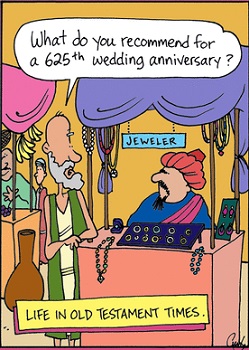

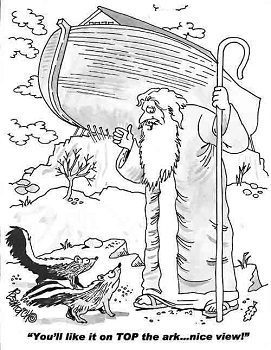
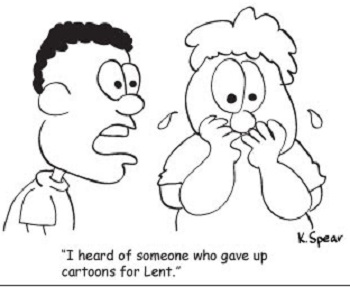

Frequently Asked Questions

Should God Perform Miracles for Pope Michael?
Father J. Vida Elmer in 1983 wrote of two Thuc Bishops, George Musey and Louis Vezelis: "I am willing to submit myself to any Catholic bishop who would prove his mission or claim with the APOSTOLIC LETTER of a genuine Pope. Or if they cannot produce it, because - as they say - the Chair is empty, I would give them another chance to gain my obedience, saying: - Please, show me a genuine miracles." He concludes: " If the new bishops of Msgr. Thuc want our submission, they have to show us either
"a) a genuine papal document as the source of their authority, or
"b) genuine miracles. - Either of them is acceptable."
In his De ecclesia Christi, Van Noort writes: "Since the original Protestants obviously lacked apostolicity of government, they took refuge in an appeal to the theory of an 'extraordinary mission.' To put it briefly, they maintained that God could at some time raise up a group of men by an extraordinary vocation and confer on them apostolic functions if current apostolic pastors should become viciously corrupt. This was the case, they asserted, with Luther and the other reformers. It is clear, however, if any such extraordinary mission were ever to be granted by God, it would have to be proven by miracles, or other clearly divine trademarks.
Rev. Anthony Cekada's article, The Validity of the Thuc Consecrations states: "Since no one in the traditional movement possesses ordinary jurisdiction, no one has the power to rule on the legal evidence that a particular sacrament was performed and then establish it as a fact before Church law." This sentiment is echoed in writings from all branches of the Traditionalist Movement not in union with Antipope Francis in Rome.
There are two types of authority or jurisdiction, ordinary and delegated. Ordinary jurisdiction is attached to an Office, such as Pope, Diocesan Bishop and Pastor. The Pope for the whole word and the Bishop for his diocese can delegate authority to deacons, priests and bishops. Traditionalists have added a third kind of authority, supplied, which is extraordinary, since with the exceptions of Musey, Vezelis and their successors, no Traditionalist claims an office in the Church.
Let us return to Vida Elmer: "When MOSES was sent by God to Pharao to demand freedom for the Israelites, God gave power to Moses to show genuine miracles and to tell short-term prophecies concerning the dire consequences of unbelief and resistance to God's commands." This is studied in seminary as well. The Mystical authors state that if someone claims an extraordinary mission from God, that they must prove this with miracles from God. Saint Vincent Ferrer did this to confirm his mission from God.
Pope Michael claims ordinary authority over the Church, therefore no miracle is required. True the manner of election was extraordinary, but no one in history has asked for miracles from a Pope elected in an unconventional election, and there have been quite of few such elections throughout history. The method of compromise, which is now permitted in Papal Election Law was not in the law, until a conclave actually used. Several elections violated the Papal Election law in force at the time, and their validity has never been questioned.
The Traditionalist bishops and priests claim an extraordinary mission, appealing to the current crisis. We should demand true miracles from them as Father (later Thuc bishops) J. Vida Elmer did in 1983. If they cannot back up their claim of mission and authority in the Church with true miracles, we should abandon them.
Of course, the question arises. If we demand Pope Michael's mission to be confirmed by miracles, who has the authority to judge if they are true miracles. The Pope is the ultimate judge of such matters, because it requires someone with ordinary authority in the Church. Such matters are not left to private judgment and never have been.
For answers to more frequently asked questions, click here: https://www.vaticaninexile.com/frequently_asked_questions.php
The Pope Speaks: March 2021
Ides of March 2020

We date the COVID-19 outbreak to the Ides of March, as this is when We first discussed this. We were visiting Our mother at her place for an Ides of March party, which We had been invited to. This party was actually on Thursday, March 19. We dismissed the virus as nothing. By the beginning of the next week, things had changed. Soon We realized, this is the end of the world as we know it. (The term TEOTWAWKI was first coined as what some thought Y2K would do at the end of 1999.) Things will never be the same again.
We have not spoken much on COVID-19. We will say a few things here. We noticed that the reaction to COVID-19 has been far worse than the virus itself. We have written two Pope Speaks on this subject. The first was on obedience to the State. https://www.vaticaninexile.com/obedience_to_the_state_june_2020.php The second was on whether or not it is a sin to wear a mask. https://www.vaticaninexile.com/august_2020_is_it_a_sin_to_wear_a_mask.php
When churches were being shut down, We quickly compiled a book on Spiritual Communion, because Spiritual Communion should be a part of our lives, especially when it is impossible to assist at Mass. https://amzn.to/376uM3D
We will not go further into the reaction of the government to COVID-19 beyond that part of the reaction that has changed the world economy. This is why things will never be the same again. We have been tracking the economy for over three and a half decades and watching for signs of its demise. The money spent to attempt to curb the economic effects on people has sent us towards potential hyperinflation. The amount spent so far is staggering, and We do not believe they are through spending.
While We are on the economy, it is time to point out how little people really understand what they are writing about. A couple of decades ago, We were waiting on an oil change. We were reading an article on the derivatives market and how large it was. It was then at one quarter of a quadrillion dollars. That is 250 trillion dollars. That is about eight and a half times the current US national debt. We only got part way through the article. When We got home, We looked up and printed out the article. It was an article on retirement. Consider a market that is larger than the value of the world at that time, if you could sell it all at market value. And you are planning for retirement. You have just told me we are doomed, but are advising how to prepare for retirement.
It is this lack of understanding by people, who should know better that is disastrous. We will not go into great details on many things or give long explanations. We will merely point out some things.
What is money? Many will pull out a dollar bill and tell us that is money, but is it? It is currency and a medium of exchange between people today. Will it be worth anything tomorrow?
Aristotle defined four marks of true money:
Durable- the medium of exchange must not weather, fall apart, or become unusable. It must be able to stand the test of time.
Portable- relative to its size, it must be easily moveable and hold a large amount of universal value relative to its size.
Divisible- should be relatively easy to separate and put back together without ruining its basic characteristics.
Intrinsically Valuable- should be valuable in of itself, and its value should be totally independent of any other object. Essentially, the item must be rare.
Does the Federal Reserve Note fill those requirements? It is not durable, nor is it intrinsically valuable, therefore it is not money. We also talk about prices rising, when in fact it is the value of our currency that is falling. And soon it will begin to fall rapidly. This decimation of the currency the world currently runs on that will change all of our lives forever.
Today many fear the mark of the beast. And some think that the COVID vaccine will include a chip that is the mark of the beast. First of all to sin, we must will to sin. "And he shall make all, both little and great, rich and poor, freemen and bondmen, to have a character in their right hand, or on their foreheads. And that no man might buy or sell, but he that hath the character, or the name of the beast, or the number of his name." (Apocalypse 13:16-17) Yes, this shall come some day, but in order to sin, we must willingly take this mark, whatever it is. They can't slip it into us without our knowledge and acceptance and us be liable for the sin. There is much speculation on this and most likely all of it is wrong.
Antichrist will be a deceiver, a great deceiver. "For there shall arise false Christs and false prophets, and shall shew great signs and wonders, insomuch as to deceive (if possible) even the elect." (Matthew 24:24) It is Our opinion that many traditional minded people will actually accept the Antichrist. That is how persuasive his deception will be.
And so how can we immunize ourselves against the deception of Antichrist? That is what the Olive Tree is dedicated to, because we must become sincere Catholics. We must not just avoid sin, but become virtuous. We must not only read the Gospel, but live the Gospel. Yes trying times are coming, but God will take care of His own. God will not take care of those who call themselves His own, but those who truly live for Him.
Some have wondered about the COVID vaccine. We are working on something far more formal. In Our research We decided to look at what they present in favor of vaccines. One website presented the case for vaccines and their effectiveness. They cited a fictional school with one thousand students. Of those thousand all but five got the MMR vaccine before the school was exposed to mumps. Of those thousand seven of the vaccinated got mumps anyway. They also made the statement: "Of course the five unvaccinated got mumps." Back in the mid 1960's We could not get the MMR vaccine, because We had been exposed to mumps a few days before. We never got mumps either. It is this presumption, which makes Us doubt their reasoning. If it were true everyone one unvaccinated would get every disease they are exposed to, which is not true. How many of us have been exposed to COVID and not gotten it?
As We are getting ready to send this to the editor, We have heard that COVID may be reducing greatly by the end of April. However, the reaction to COVID has already caused irreparable damage. Now is the time to become saints! Let us pray.


Saint Mark the Ascetic
On The Spiritual Law

81. He who despises understanding and boasts of ignorance is unlearned not only in speech but also in knowledge (cf. 2 Cor. 11:6).
82. Just as wisdom in speech is one thing and sound judgment another, so lack of learning in speech is one thing and folly another.
83. Ignorance of words will do no harm to the truly devout, nor will wisdom in speaking harm the humble.
84. Do not say: 'I do not know what is right, therefore I am not to blame when I fail to do it.' For if you did all the good about which you do know, what you should do next would then become clear to you, as if you were passing through a house from one room to another. It is not helpful to know what comes later before you have done what comes first. For knowledge without action 'puffs up,' but 'love edifies,' because it 'patiently accepts all things' (1 Cor. 8:1; 13:7).
85. Understand the words of Holy Scripture by putting them into practice, and do not fill yourself with conceit by expatiating on theoretical ideas.
86. He who neglects action and depends on theoretical knowledge holds a staff of reed instead of a double-edged sword; and when he confronts his enemies in time of war, 'it will go into his hand, and pierce it' (2 Kgs. 18:21), injecting its natural poison.
87. Every thought has its weight and measure in God's sight. For it is possible to think about the same thing either passionately or objectively.
88. After fulfilling a commandment expect to be tempted: for love of Christ is tested by adversity.
89. Never belittle the significance of your thoughts, for not one escapes God's notice.
90. When you observe some thought suggesting that you seek human fame, you can be sure it will bring you disgrace.
Saints from East and West
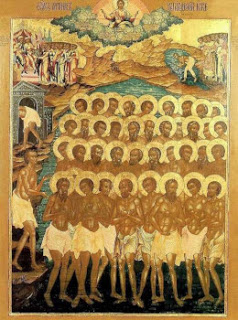
9 March - The Forty Holy Martyrs of Sebaste.
The Forty Holy Martyrs martyred at Sebasteia Lake: In the year 313 Saint Constantine the Great issued an edict, from which the Christians were permitted freedom of belief and made equal with pagans under the law. But his co-ruler Licinius was prevailed upon by pagans, and in his part of the empire he decided to eradicate Christianity, which had become considerably widespread there. Licinius prepared his soldiery to fight against Constantine and, fearing mutiny, he decided to rid Christians from his army.
One of the military-commanders of that time in the Armenian city of Sebaste was Agricolaus, a zealous proponent of paganism. Under his command was a company of forty Cappadocians - brave soldiers - who emerged victorious from many a battle. All of them were Christians. When these soldiers refused to offer sacrifice to the pagan gods, Agricolaus locked them up in prison. The soldiers immersed themselves in diligent prayer, and at one point during the night they heard a voice: "Persevere until the end, then shalt ye be saved."
On the following morning the soldiers were again taken to Agricolaus. This time the pagan tried the method of flattery. He began to praise their valour, their youthfulness, and strength; and again he urged them to renounce Christ and thereby win themselves the respect and favour of their emperor. And again hearing their refusal, Agricolaus gave orders to shackle the soldiers. But the eldest of them, Kyrion, said: "The emperor has not given thee the right to put shackles upon us." Agricolaus became embarrassed and gave an order to take the soldiers back to prison without shackles.
Seven days later, the reknown judge Licius arrived at Sebaste and held trial over the soldiers. The saints steadfastly answered: "Take not only our military insignia, but also our lives, since nothing is more precious to us than Christ God." Licius thereupon ordered the holy martyrs to be beaten with stones. But the stones flew past them entirely; and the stone thrown by Licius hit Agricolaus in the face. The torturers realised that the saints were guarded by some invisible force. In prison, the soldiers spent the night at prayer and again they heard the voice of the Lord comforting them: "Believing in Me, if anyone shalt die he shalt live. Be brave and fear not, since ye shall obtain crowns imperishable."
On the following day also the judge repeated the interrogation in front of the torturer, but the soldiers remained unyielding.
It was winter, and there was a strong frost. They lined up the holy soldiers, led them to a lake located not far from the city, and placed them under guard on the ice all night. In order to break the will of the martyrs, a warm bath-house was set up not far away on the shore. During the first hour of the night, when the cold had become unbearable, one of the soldiers could not hold out and made a dash for the bath-house, but barely had he stepped over the threshold, that he fell down dead. During the third hour of the night the Lord sent consolation to the martyrs: suddenly there was light, the ice melted away, and the water in the lake became warm. All the guards were asleep, except for one who kept watch by the name of Aglaios. Looking at the lake he saw, that over the head of each martyr there had appeared a radiant crown. Aglaios counted thirty-nine crowns and realised, that the soldier who fled had lost his crown. Aglaios thereupon woke up the other guards, discarded his uniform and said to them: "I too am a Christian," and he joined the martyrs. Standing in the water he prayed: "Lord God, I believe in Thee, in Whom these soldiers do believe. To them add me also, and esteem me worthy to suffer with Thy servants."
In the morning the torturers beheld with surprise that the martyrs were alive, and their guard Aglaios was glorifying Christ together with them. They then led the soldiers out of the water and broke their legs. At the time of this horrible execution the mother of the youngest of the soldiers, Meliton, pleaded with her son not to endure and suffer everything all the way to death. They put the bodies of the martyrs on a cart and committed them to fire. Young Meliton was still breathing, and they left him to lay on the ground. His mother then pulled up her son, and on her own shoulders she carried him behind the cart. When Meliton gasped out his last breath, his mother put him on the cart amidst the bodies of his fellow sufferers. The bodies of the saints were committed to fire, and they then threw the charred bones into the water, so that Christians would not gather them up.
Three days later the martyrs appeared in a dream to Blessed Peter, bishop of Sebaste, and commanded him to give their remains over to burial. The bishop together with several clergy gathered up the remains of the glorious martyrs by night and buried them with honour.
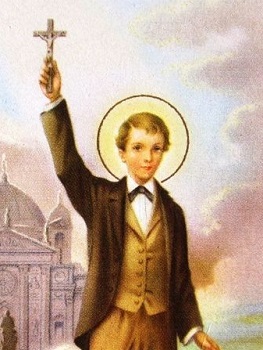
9 March - Saint Dominic Savio.
The year 1950 saw the canonization of a twelve-year-old girl, Mary Goretti, as a martyr and the beatification of a fifteen-year-old boy, Dominic Savio, as a confessor. The Church has raised several child martyrs to her altars, but the case of Dominic Savio seems to be unique. He was canonized in 1954.
He was born at Riva in Piedmont in 1842, the son of a peasant, and grew up with the desire to be a priest. When Saint John Bosco began to make provision for training youths as clergy to help him in his work for neglected boys at Turin, Dominic's parish-priest recommended him. An interview took place, at which Don Bosco was most deeply impressed by the evidence of grace in the boy's soul, and in October 1854, when he was twelve, Dominic became a student at the Oratory of Saint Francis de Sales in Turin.
His own personality apart, Dominic was best remembered at the oratory for the group he organized there. It was called the Company of the Immaculate Conception, and besides its devotional objects it helped Don Bosco in his work by undertaking various necessary jobs, from sweeping the floors to taking special care of boys who for one reason or another were misfits. When the time came, in 1859, for Saint John Bosco to form the kernel of his now world-wide Salesian congregation, among the twenty-two present were all the original members of the Company of the Immaculate Conception; all, that is, except Dominic Savio: he had been called to the congregation of Heaven two years before.
Early on at the oratory Dominic prevented a brutal fight with stones between two boys by characteristically direct action. Holding up a little crucifix between them, "Before you fight," he said, "look at this, both of you, and say, 'Jesus Christ was sinless, and He died forgiving His executioners; I am a sinner, and I am going to outrage Him by being deliberately revengeful.' Then you can start - and throw your first stone at me." The rascals slunk away.
He was scrupulous in observing the discipline of the house, and some of the wilder spirits did not like it when he expected them to be equally scrupulous. They called him a sneak, and told him to "run and tell Don Bosco" - thereby showing how little they knew about Don Bosco, who would not tolerate tale-bearing. Likely enough Dominic laughed it off; for he was a ready laugher, and sometimes it got him into trouble with the masters. But if he was no tale-bearer he was a good story-teller, and that endeared him to his companions, especially the younger ones.
It was a specially happy dispensation of Providence that brought Dominic Savio under the care of so moderate and wise a man as Saint John Bosco: otherwise he might have developed into a young fanatic and spoiled himself by excess. Don Bosco insisted on cheerfulness, on careful attention to daily duties, on joining in the games, so that Dominic would say, "I can't do big things. But I want all I do, even the smallest thing, to be for the greater glory of God." "Religion must be about us like the air we breathe; but we must not weary the boys with too many devotions and observances and so forth," Don Bosco used to say. And, true to that spirit, he forbade Dominic to inflict the least bodily mortification upon himself without express permission. "For," he said, "the penance God wants is obedience. There is plenty to put up with cheerfully - heat, cold, sickness, the tiresome ways of other people. There is quite enough mortification for boys in school life itself." Nevertheless he found Dominic shivering in bed one cold night, with all the bed-clothes save one thin sheet thrown off. "Don't be so crazy," he said, "You'll get pneumonia." "Why should I?" replied Dominic. "Our Lord didn't get pneumonia in the stable at Bethlehem."
The most important source for the details of Dominic Savio's short life is the account written by Saint John Bosco himself. In writing it he was careful not to set down anything that he could not vouch for, and he was most particularly careful when dealing with the spiritual experiences that were accorded to this boy: such things as supernatural knowledge - of people in need, of their spiritual state, of the future. Or the occasion when Dominic was missing all the morning till after dinner. Don Bosco found him eventually in the choir of the church, standing in a cramped position by the lectern, rapt in prayer. He had been there for about six hours, yet thought that early Mass was not yet over. Dominic called these times of intense prayer "my distractions." They would sometimes overtake him at play: "It seems as though Heaven is opening just above me. I am afraid I may say or do something that will make the other boys laugh."
Saint John Bosco tells us that the needs of England had an important part in this boy's prayers; and he records "a strong distraction" in which Dominic saw a wide mist-shrouded plain, with a multitude of people groping about in it; to them came a pontifically-vested figure carrying a torch that lighted up the whole scene, and a voice seemed to say, "This torch is the Catholic faith which shall bring light to the English people." At Dominic's request Don Bosco told this to Pope Pius IX, who declared that it confirmed his resolution to give great care and attention to England.
Dominic's delicate health got worse and worse, and in February 1857 he was sent home to Mondonio for a change of air. His complaint was diagnosed as inflammation of the lungs, and according to the practice of the day he was bled, bled to excess. The treatment seems certainly to have hastened his end. He received the last sacraments, and on the evening of March 9 he asked his father to read the prayers for the dying. Towards the end of them he tried to sit up. "Good-bye, father," he murmured, "the priest told me something... But I can't remember what..." Suddenly his face lit up with a smile of intense joy, and he exclaimed, "I am seeing most wonderful things!" He did not speak again.
The cause of the beatification of Dominic Savio was begun in Rome in 1914. It met with some opposition on the ground of his extreme youth. Pope Pius X on the other hand regarded his age as a point in favour of beatification. This view eventually prevailed; but Dominic Savio was not beatified till 1950, sixteen years after the canonization of Don Bosco.


Books to feed your faith!
Will the Real Catholic Church Stand Up?
Kindle $2.99 / Paperback $9.95
Lenten Instructions from the Roman Breviary
$9.95
The Roman Breviary is full of inspirational prayers and lessons. These lessons are compiled from the lessons of Matins. On Sundays and greater feasts Matins consists of three nocturns. Each nocturn consists of three psalms and three lessons. The first nocturn has lessons from Sacred Scripture. Since the Bible is readily available, this is omitted from this work. The second nocturn on the feast of saints gives their life story. It is these stories, which are most instructive. On Sundays, these lessons are an explanation either of the current Scripture or some other inspirational instruction and these are included here. The third nocturn is on the day's Gospel. The first lesson begins with a short quote from the Gospel of the day, followed by the beginning of the instruction. These are included here. On smaller feasts and ferial days, there is only one nocturn of nine psalms and three lessons. In Lent, these lessons are on the day's Gospel, while on other ferial days they are from Scripture. On minor feast days, the first two are from Scripture, the third on the day's feast. In Lent there are forty different Gospels read, and the lessons on these form the bulk of this work. The lessons in the Breviary come from the Fathers of the Church and are quite instructive. This work would serve as a good companion to Sunday Sermons of the Great Fathers, as it covers material not contained in this other excellent work. The Fathers of the Church bring out points we may not have considered in our meditations on the daily Gospels. We pray all find these instructions as fruitful as I have. We have included the instructions for the three Sundays prior to Ash Wednesday, Septuagesima, Sexagesima and Quinquagesima, as they form a remote preparation for the commemoration of the mysteries of our Redemption at the end of Holy Week.
The Liturgical Year: Lent (Volume 5)
$24.95
This is a fifteen volume set, which is being brought back into print for the edification of the Faithful. Anyone who wishes to appreciate the timeless Tridentine Mass and liturgy will find this set a valuable aid in that endeavor. Dom Gueranger has produced a most excellent work, which began the liturgical movement. We pray that this set of books will bring many more to a true appreciation of the Latin Mass and the Divine Office of the Catholic Church. At one time, under the impulse of that Spirit, which animated the admirable Psalmist and the Prophets, she takes the subject of her canticles from the Books of the Old Testament; at another, showing herself to be the daughter and sister of the holy Apostles, she intones the canticles written in the Books of the New Covenant; and finally, remembering that she, too, has had given to her the trumpet and harp, she at times gives way to the Spirit which animates her, and sings her own new canticle. From these three sources comes the divine element which we call the Liturgy. The Prayer of the Church is, therefore, the most pleasing to the ear and heart of God, and therefore the most efficacious of all prayers. Happy, then, is he who prays with the Church, and unites his own petitions with those of this Spouse, who is so dear to her Lord, that he gives her all she asks. It was for this reason that our Blessed Saviour taught us to say our Father, and not my Father; give us, forgive us, deliver us, and not give me, forgive me, deliver me. Hence, we find that, for upwards of a thousand years, the Church, who prays in her temples seven times in the day, and once again during the night, did not pray alone. The people kept her company, and fed themselves with delight on the manna which is hidden under the words and mysteries of the divine Liturgy. Thus initiated into the sacred Cycle of the mysteries of the Christian year, the faithful, attentive to the teachings of the Spirit, came to know the secrets of eternal life ; and, without any further preparation, a Christian was not unfrequently chosen by the Bishops to be a Priest, or even a Bishop, that he might go and pour out on the people the treasures of wisdom and love, which he had drunk in at the very fountain-head. For whilst Prayer said in union with the Church is the light of the understanding, it is the fire of divine love for the heart. The Christian soul neither needs nor wishes to avoid the company of the Church, when she would converse with God, and praise his greatness and his mercy. She knows that the company of the Spouse of Christ could not be a distraction to her. Is not the soul herself a part of this Church, which is the Spouse? Has not Jesus Christ said: Father, may they be one, as we also are one? and, when many are gathered in his name, does not this same Saviour assure us that he is in the midst of them? The soul, therefore, may converse freely with her God, who tells her that he is so near her; she may sing praise, as David did, in the sight of the Angels, whose eternal prayer blends with the prayer which the Church utters in time.
Charity: A Commentary on I Corinthians 13 by Saint Alphonsus
$9.99 paperback / $0.99 Kindle
Charity is patient, is kind: charity envieth not, dealeth not perversely; is not puffed up; Is not ambitious, seeketh not her own, is not provoked to anger, thinketh no evil; Rejoiceth not in iniquity, but rejoiceth with the truth; Beareth all things, believeth all things, hopeth all things, endureth all things. (I Corinthians 13:4-7) Saint Paul wrote wonderfully about charity in the 13th chapter of First Corinthians. Saint Alphonsus takes these words and gives a simple view of the Catholic way of life and an excellent introduction into the spiritual life. This is excerpted from his work, The Holy Eucharist, which has been excerpted from The Complete Works of Saint Alphonsus, which was compiled and translated by Father Eugene Grimm. (1835-1891)
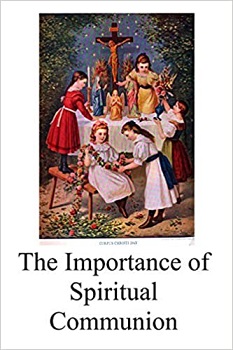
The Importance of Spiritual Communion
Kindle $2.99 / Paperback $5.99
If we cannot receive Holy Communion actually, then let us do so spiritually. These prayers and instructions have been gathered from the Saints and other venerated spiritual writers. Spiritual Communion has been a part of the spiritual life for decades. Growing up I was instructed to make a Spiritual Communion, when I could not go to Communion such as when I assisted at a second Mass. The same is true if one finds oneself at Mass, but not fasting. There are times coming, when it will be difficult, if not impossible to assist at the Holy Sacrifice of the Mass. We should be prepared for such times.
For More Good Traditional Catholic Books:

Toasted Buckwheat Tabouli Salad

Prep: 20 mins
Cook: 15 mins
Total: 35 mins
Servings: 4
Yield: 4 servings
Ingredients
1 cup kasha (toasted buckwheat groats)
1 tablespoon olive oil
2 onions, peeled and chopped
1 clove garlic, minced, or to taste
1 cucumber, peeled and diced
¾ cup chopped fresh parsley
6 tablespoons chopped fresh mint
1 lemon, juiced
1 pinch dried mixed herbs
Directions
1. Rinse buckwheat groats. Bring a saucepan of water to a boil, sprinkle in the buckwheat groats, and simmer until buckwheat is tender, about 10 minutes. Drain and cool.
2. Heat oil in a skillet over medium heat; cook and stir onions and garlic until onion is translucent, 5 to 8 minutes. Set aside to cool.
3. Lightly toss cucumber, parsley, mint, lemon juice, and mixed herbs in a large salad bowl until thoroughly combined; stir in cooked buckwheat and onion mixture.
Vegetable-Loaded Potato Stew

Prep: 30 mins
Cook: 20 mins
Total: 50 mins
Servings: 4
Yield: 4 servings
Ingredients
3 ½ cups vegetable broth
3 cups (1-inch) potato chunks
1 teaspoon salt, or to taste
1 teaspoon dried oregano, or to taste
1 teaspoon dried parsley, or to taste
1 teaspoon dried cilantro, or to taste
½ teaspoon ground black pepper, or to taste
¼ cup finely chopped red bell pepper
¼ cup finely chopped white onion
¼ cup finely chopped leek
¼ cup finely chopped carrot
¼ cup finely chopped celery
4 garlic cloves, minced
Directions
1. Combine vegetable broth, potatoes, salt, oregano, parsley, cilantro, and pepper in a saucepan over medium-high heat.
2. Bring to a boil; cook until potatoes start to soften, about 5 minutes.
3. Stir in garlic.
4. Add red bell pepper, onion, leek, carrot, and celery; simmer until potatoes are very tender when pierced with a fork, about 10 minutes more.
Video sermons and instructions: Timeless timely truths for living the Faith
Passion Sunday 2011
Laetare Sunday 2012
Curiosity
Sacred Moments: What Makes A Man Spiritual

Encouragement for Today
Therefore encourage one another and build one another up.... I Thessalonians 5:11
We believe that through our assorted podcasts, Vlogs, audio downloads and devotional blogs, you will find an assorted Treasure Chest of...
- Sermons
- Classic Catholic Audio Books.
- Devotionals
- Scripture Studies
- Catechism Lessons
- Old-Time Christian radio programs
- Catholic Videos
...that will be a help in your faithful walk with the Lord.
LEARN MORE AT THE ENCOURAGEMENT FOR TODAY WEBSITE: https://www.encouragementfortoday.com
An Elusive Signal
“And there are bodies celestial, and bodies terrestrial: but, one is the glory of the celestial, and another of the terrestrial. One is the glory of the sun, another the glory of the moon, and another the glory of the stars. For star differeth from star in glory.”
- I Corinthians 15:40-41.

“Around 12 billion years ago, the universe emerged from a great cosmic dark age as the first stars and galaxies lit up.” This is not the start of a sci-fi or fantasy novel, but of a scientific report on attempts to discover an early event in Big Bang cosmology. At the time of writing, deep-time cosmologists believe that the universe came into existence 13.7 billion years ago – but watch this space! This figure is subject to change. Then, they have to believe that stars began to light up at another point in time, which they refer to as the “Epoch of Reionization” or EoR. This cosmic switch on, they believe, must have left a faint signal. So they calibrated their detection equipment – Australia’s Murchison Widefield Array (MWA) radio telescope – to detect signals fainter than anything previously detected.
One scientist remarked, “We can say with confidence that if the neutral hydrogen signal was any stronger than the limit we set in the paper, then the telescope would have detected it.” This is an odd way to describe their methodology.
“Scientists are now closer than ever to detecting the ultra-faint signature of this turning point in cosmic history,” the article explains. The signal is elusive because they have discounted anything currently observed.
One will note that these scientists have already assumed their conclusion and wish to find data that supports their existing conclusion. Even without a scientific qualification, listeners should notice that this is the wrong way around for doing science.
Prayer: We are constantly reminded, as we look at Your universe, Lord God, of Your great and wonderful care for us. Amen.
Catechism Catch-Up
The 9th and 10th Commandment: Covetousness Lesson 16
“Thou shalt not covet thy neighbour's house: neither shalt thou covet his wife, nor his servant, nor his handmaid, nor his ox, nor his ass, nor any thing that is his.” The key word “covet” is repeated, emphasizing its importance.
That leads us to a definition. The Hebrew word is used in both positive and negative senses. In its positive sense, the word simply means “a strong desire.” It can also mean “delight, dear, precious and desirable.” Used in the negative sense, the word means “a strong desire for something I have no right to have.”
—The Tenth Commandment is not forbidding strong desire in general.
—It’s the object of the strong desire which crosses the line into coveting.
—That’s why specific objects are named in the verse:
—I have no right to possess my neighbor’s wife.
—Or his house
—Or his servants
—Or his animals
Genesis 2-3 provide useful examples of the good and bad uses of the same Hebrew word:
—In Genesis 2:9 the trees in Eden are described as delightful, fair or pleasant.
—In Genesis 3:6 the tree of the knowledge of good and evil was fair and delightful to the woman even though God had put it off limits. She coveted (or “strongly desired") that which God had put off limits to her.
The application of the Ninth and Tenth Commandment is clear: I must not set my sights on that which I have no right to possess.
Are You Happy?
All of which leads me to a simple question: Are you happy? Really happy? Are you satisfied with your life? Here is the startling truth: We have paradise and we are still unhappy. If things could make us happy, we’d be in paradise every day. We think “more is better.” Is it? It seems the more we have, the less we like it.
If having more would make us happy, we would never need the Ninth and Tenth Commandment. It is written for unhappy people!
Perhaps you’ve heard the story about the king who fell into a serious depression. Nothing could lift his spirits. His servants tried everything—music, dancing, court jesters, lavish banquets, beautiful flowers—nothing seemed to help him. Finally an old and wise man came to the king with an unusual piece of advice. “O King, if you can obtain the shirt off the back of a truly happy man, you yourself will be happy.” Upon hearing those words, the king ordered his men to search the four corners of the earth and bring him the shirt off the back of a truly happy man. Weeks passed, then months. Finally his soldiers returned. “O King, after many days and much searching, we found a truly happy man. But your majesty, the man was not wearing a shirt.”
“If Only I Had …”
How fitting, how true to life. We think to ourselves, “If only I had … “ and then we fill in the blank with our latest dream. A new house, a new wife, a new set of children, a new job, a new school, a new career, a new parish, a new portfolio, a new start in life.
Oh how happy we’d be … . If only!
—No wonder we’re unhappy
—No wonder we’re discontented
—No wonder we’re miserable
—No wonder we dream so much
Coveting has done its evil work within. It has bored its way into our soul, eating away our happiness, leaving us empty, frustrated and angry.
I confess that I find these two Commandments personally challenging. If the truth were known, I play the “if only” game as much as anyone else. There are times when I truly believe I would be happy if only I lived in a big monastery. Sometimes I think, “If only I had a nice Church building, I could be a much better pastor.” Or I think, “If only we lived on hundreds of acres in the Mountains of Virginia I’d be the happiest, most contented man in all the world.” I really am tempted to think those things!
But that raises a question. At what point does legitimate desire become coveting? Coveting occurs either when I desire something I have no right to have my neighbor’s wife or when the desire becomes the controlling passion of my life so that I begin to believe that my happiness depends on the acquisition of the item itself.
—A new house may be nice, but my happiness does not depend on a new house. If it does, then I am coveting.
—A new car may help my image, but it can’t be the source of my happiness. If it is, then I am coveting.
The moment I trick myself into thinking, “This (item or goal) is necessary for my happiness in life,” then I have crossed the line into coveting.
Let me say it again. If having more would make us happy, we would never need the Ninth and Tenth Commandments. It is written for unhappy people.
I. Five Facts About Coveting
A. This is an Invisible Sin.
Most of the other sins are easy to spot. You either murder someone or you don’t. You steal or you don’t. You lie or you don’t. You commit adultery or you don’t. At least on the outward level, most of the others sins have some kind of visible manifestation.
Coveting is invisible. A person may be quite wealthy and not covet at all. You may drive a BMW and have a Rolex watch on your wrist and not have a covetous bone in your body. The Bible does not teach that wealth is evil or that all wealthy people are covetous. Not at all!
Coveting happens inside the heart when our desires begin to get out of control. In that sense, a poor person is just as likely (even more likely?) as a rich person to commit this sin. Perhaps the truly rich have learned the lesson that things don’t bring happiness; some poor people live miserable lives—not because of their poverty but because of their coveting spirit. They truly believe that if only they had a Rich persons money, they too would be happy.
Obviously this is not a human commandment. There’s no way it could be. Why not? Because there’s no way that human beings could police this tendency. You can make a person take a day off. You can penalize the murderer. You can prosecute the thief. But covetousness goes beneath public conduct. It touches at the motivational level, which society cannot patrol. It takes God to probe deeply into our inner motivations in a way that roots out those attitudes which can produce outward antisocial behavior.
That’s the tricky part of coveting. Since it is invisible we tend not to take it seriously. Coveting is truly the sin few will admit.
B. It is the Root of All Other Sins.
In Romans 7 Paul recounts the moment in his own life when he realized his own sinfulness. He says it came as he began to consider his life in light of the Ten Commandments. All went well until he got to the last of the Commandments:
What then shall we say? That the law is sin? By no means! Yet if it had not been for the law, I would not have known sin. For I would not have known what it is to covet if the law had not said, “You shall not covet.” But sin, seizing an opportunity through the commandment, produced in me all kinds of covetousness. For apart from the law, sin lies dead. I was once alive apart from the law, but when the commandment came, sin came alive and I died. (Romans 7:7-9)
Maybe what happened to Paul went like this. Paul was reading through the Ten Commandments and checking them off if he had obeyed them.
"No other Gods or Idols? Check.”
"Don’t use God’s name lightly? Never think of it.”
"Keep the Sabbath? Always.”
"Honor my parents? You bet.”
"Don’t murder? Never dreamed of it.”
"Don’t commit adultery? Check.”
"Don’t steal? I’m no thief.”
"Don’t lie? I always tell the truth.”
"Don’t covet? Hmmmm. I wonder what that means.”
You see, Paul was doing great on the first eight Commandments because he only stayed on the surface. But you can’t do that with coveting. There is no “surface” to stay on. It’s not like murder or adultery. Coveting deals only with the heart. When Paul started dealing with his heart, he suddenly discovered he was indeed a covetous man. In fact, once he read “Do not covet,” coveting became a huge problem in his life.
Does that mean he never coveted before? No! It means he never realized what he was doing. Suddenly he found himself beset by every kind of covetous desire. The very act of saying “Don’t” awakened within him a desire to “Do.”
Saying “Don’t lust” made him want to lust.
Saying “Don’t steal” made him want to steal.
Saying “Don’t lie” made him want to lie.
Sound strange? What’s your first impulse when you see a sign that says, “Wet paint. Don’t touch?” Once you see the sign, there is an almost irresistible impulse to reach out and touch the wet paint. The desire was always there; the sign awakened it within you.
It’s like that old trick of asking children to close their eyes and to think of anything they like … except a pink elephant. What will the kids immediately think about? A pink elephant! The very act of saying “Don’t” awakened the desire to do that which was forbidden!
Forbidden Fruit
In his Confessions St. Augustine gives a classic description of this principle:
"There was a pear tree near our vineyard, laden with fruit. One stormy night we rascally youths set out to rob it and carry spoils away. We took off a huge load of pears—not to feast upon ourselves, but to throw them to the pigs, though we ate just enough to have the pleasure of forbidden fruit. They were nice pears, but it was not the pears my wretched soul coveted, for I had plenty better at home. I picked them simply in order to become a thief. The only feast I got was a feast of iniquity, and that I enjoyed to the full. What was it that I loved in that theft? Was it the pleasure of acting against the law, in order that I a prisoner under rules might have a maimed counterfeit of freedom by doing that which was forbidden? … The desire to steal was awakened simply by the prohibition of stealing. The pears were desirable simply because they were forbidden."
Do you get the principle?: Whenever a thing is forbidden it becomes desirable.
That which a man must not have, becomes the very thing he now must have at all costs.
Which is why censorship doesn’t work very well. If you tell teenagers, “Don’t listen to this record,” what will they do? They’ll line up around the block to buy that record. If you say, “This movie ought to be banned,” you almost guarantee its commercial success. Saying “You must not” produces within us a perverse desire to do the thing that is forbidden—even if we know that the forbidden thing is not good for us. We want it anyway! We do it anyway!
Coveting is the root of all other sin because it causes us to want that which is forbidden.
C. It Begins Close to Home.
Did you notice that the Ninth and Tenth Commandment refers to the “neighbor” three times?
—“His” The neighbors house
—"His” The neighbor’s wife
—Anything that belongs to “Him” the neighbor
We might tend to overlook that but we shouldn’t. Coveting begins at home.
One of the most popular movies of 1991 was a horrific thriller called The Silence of the Lambs. The movie was all about a serial killer named Hannibal Lechter and his strange friendship with a young FBI Special Agent named Clarice Starling. In the beginning Hannibal Lechter is being held by the FBI in a special cell designed to prevent any possibility of escape. As Clarice Starling gets to know him, she asks for his help in capturing another serial killer. He agrees to help, and in a climactic scene set in Memphis, Tennessee, Hannibal Lechter explains to Clarice Starling where she should begin to look. In the process he gives her what amounts to a lecture in biblical theology.
“What was the original sin, Clarice?”
“Excuse me.”
“What was the original sin in Eden?”
“I don’t know and I don’t have time to play games.”
“Think. What was the sin that Adam and Eve committed?”
“I don’t know.”
“It was coveting. They wanted something they couldn’t have.”
“So what?”
“That’s the answer, Clarice.”
“What do you mean?”
“The man you are looking for is a covetous man. He wants something he can’t have.”
Then Hannibal Lechter explains what he means in a sentence of pure spiritual truth: “We covet what we see every day.” Go back, he says, go back and find his hometown. Go back and see what he sees every day. There you will find your answer.
What an incredible insight! “We covet what we see every day.”
—Our neighbor’s wife.
—Our neighbor’s house.
—Our neighbor’s car.
—Our neighbor’s fame.
—Our neighbor’s money.
We rarely covet things far away from us. It’s the things we see everyday that bother us. We want what our neighbor has—not what some stranger has. Perhaps we see Someone who is very rich and think, “I wonder what I’d do if I had two billion dollars.” But that’s not coveting. We don’t even know that rich person and besides, we could hardly handle a measly million dollars, much less a billion. That Billionaire is so far removed from us that he really doesn’t qualify as a “neighbor” whose money we can covet.
Ah, but what about Mr. and Mrs. Jones next door. He just got a promotion … their daughter just got accepted at Yale … she’s driving a new car … and wow!, did you get a look at that game room they added on the second floor. It’s easy to envy the Jones’s, then to covet what they have, and finally to spend everything you have in order to keep up with them.
If you want to spot the covetous parts of your life, start close to home … with the things and people you see every day.
D. It Springs from an Ungrateful Heart.
Coveting is nothing more or less than an attempt to improve upon God. The covetous man moans and groans because he believes that he has been treated unfairly. When all the goodies were passed out, he got nothing but crumbs.
—When I covet my neighbor’s house, am I not really saying that God has not provided adequate shelter for me?
—When I covet my neighbor’s wife, am I not expressing my discontentment with the spouse God has given me?
—When I covet my neighbor’s children, am I not implying that God cheated me by giving me the rot-ten kids and my neighbor the good ones?
—When I covet my neighbor’s promotion, am I not doubting God’s ability to advance my career?
—When I covet my neighbor’s good health, am I not accusing God of failing to take care of my physical needs?
—When I covet my neighbor’s wealth, am I not saying that God has failed to provide for me?
The covetous man doubts
God’s wisdom
God’s goodness
God’s justice
God’s timing
and ultimately God’s love.
Coveting is a terrible sin because it is a seemingly secret attack on God himself. Those who covet are saying, “God, you haven’t taken care of me.” They are blaming God for his failure to meet their needs.
E. It Destroys Life.
Do yo u remember the parable of the Rich Fool? Jesus told a story about a farmer whose crops brought in a good harvest. In fact, the harvest was so good that he didn’t know how to handle it all. So he decided to tear down his old barns and build bigger ones. “And I will say to my soul: Soul, thou hast much goods laid up for many years take thy rest; eat, drink, make good cheer. But God said to him: Thou fool, this night do they require thy soul of thee: and whose shall those things be which thou hast provided?” (Luke 12:19-20)
Simple story, good question, clear moral. Jesus told us exactly what this story means, “So is he that layeth up treasure for himself, and is not rich towards God.” (Luke 12:21)
It’s easier to note what this parable is not teaching:
—Jesus is not condemning business success.
—Nor is he condemning planning for the future.
—Nor does he condemn expanding your property.
—Nor is he saying it is wrong to enjoy life.
—He is not suggesting that rich people shouldn’t get richer.
—He is not condemning prosperity.
What, then, did this rich man do that merited being called a “fool?”
- He acted selfishly with no concern for anyone else.
- He acted with no regard for his long-term future.
This “rich fool” is the classic example of a covetous man. He wanted more barns to give him more space to hold his ever-increasing harvests. He truly felt that he was a self-sufficient man. He didn’t need anyone else; he did it on his own. Most importantly, he didn’t need God!
Coveting makes senses as long as you are going to live forever! But if you plan to die someday, coveting is the most foolish thing you can do.
We live in the most technologically advanced generation the world has ever known. We enjoy inventions our grandparents couldn’t even imagine. We have tools at our fingertips that enable us to pick up the phone and send messages around the world … instantly. We have phones in our cars and beepers on our belts. We are tuned in and wired up.
—No generation has ever had what we have.
—No generation has been so advanced.
—No generation has enjoyed our privileges.
If having more could make you happy, we ought to be the happiest people in the world. But we’re not. We’re miserable, neurotic, unhappy, confused and dissatisfied. We’re hung up, up tight, frustrated and extremely materialistic. Our marriages fail, our homes break up, our children struggle, our lives don’t hold together. We’ve got it all! And it’s still not enough! We ought to be happy … but we’re not!
II. Practical Steps Toward Contentment
What is the answer for the curse of covetousness? Is there a way out? I believe there is. It’s called contentment. You can’t be content and covet at the same time. You can be contented … or you can covet … but you can’t do both.
Let me suggest three simple steps you can take.
A. Guard Your Heart.
This means pay attention to your desires. Every act was once a thought; every purchase was once a desire; every foolish word was once an idea. How carefully we must guard the heart lest some evil or illicit desire should spring up. This touches such practical areas as:
—Idle thoughts
—Comparing cars and clothes and houses
—Impulsive desires to spend more money
—Cheap comments about other people
—Unfair judgments on those who have more than we do
—Desires that subtly slide over into lust
—Rationalizing our lust
—Excusing our greed
—Laughing at our excess
—Justifying our foolish purchases
—Lying to ourselves about what we “really” need
—Using credit carelessly
In this economy all of us want to save money. No one can afford to throw it away foolishly. Everyone says, “Live within your means.” But how many of us do it? It reminds me of the man who said, “I’m going to live within my means even if I have to borrow money to do it!”
Be careful!
Guard your heart!
Do not allow yourself to be swept away by foolish desire!
Learn how to say “No"!
B. Become a Great Giver.
Please don’t miss this point. How do you overcome a covetous spirit? You give your way out of it. That’s right. You start giving things away. Why? Because you can’t be a “giver” and a “taker” at the same time. Nothing cures greed like a truly generous heart.
If something becomes too important to you … try giving it away!
—Like your clothes? Sure.
—Like your car? Why not?
—Like your house? Absolutely.
Nothing breaks the stranglehold of uncontrolled desire like giving things away.
Would you like to experience freedom from the cancer of coveting? It’s not that difficult. Start by giving some-thing away. Then do it again. And again. And again. Coveting can’t stay inside a generous heart!
—You’ll either stop giving.
—Or you’ll stop coveting.
C. Ask God to Give You a Grateful Heart.
This one is so simple that we miss it. Why aren’t we more grateful? There are many answers to that question, but this one is central: We aren’t grateful because we’ve never asked God to give us a grateful heart. By nature we are covetous, greedy, grasping and unhappy. Left to ourselves, we will be just like that rich fool. Generosity isn’t our natural impulse. We aren’t born giving; we’re born getting. Gratitude is not the inborn language of the heart.
Epicurus said, “If you want to make a man happy, add not to his possessions, but take away from his desires.” Far too many of us work hard at the first half—we’re professionals at adding to our own possessions. But how many of us even think about taking away from our desires? Yet that’s where contentment comes from.
Jesus said, “Seek ye therefore first the kingdom of God, and his justice, and all these things shall be added unto you” (Matthew 6:33) Healing begins when you refocus your life on Jesus Christ. Nothing human can cure covetousness; only an infusion of the supernatural power of Christ can make a lasting difference. One Bishop called it “the expulsive power of a new affection.” Nothing will expel a coveting spirit except the power of a brand-new affection—a new love for Jesus Christ.
READ MORE FROM THE TRADITIONAL CATECHISM AT THE WEBSITE: https://www.traditionalcatechism.com
Living Catholic:
How Do The Sins Of The Past Generation Affect The Next Generation?

Understanding Your Spiritual Heritage
recognizing the iniquities of your forefathers
Looking back to our parents, grandparents, and great-grandparents, we can often trace our physical features, strengths, and weaknesses through the family line. In the same way, we can observe character traits and spiritual influences that span the generations. A Godly heritage offers a sturdy foundation of virtue and faithfulness, but deeds such as anger, lust, and bitterness set destructive patterns that need to be recognized and overcome.
In the Biblical account of Abraham’s family, the iniquity of deception became a stronghold that affected the lives of Abraham, Isaac, Jacob, and Jacob’s sons. (See Genesis 12:10–20, 20, 26:1–11, 27:1–40, 37:12–36.) On the other hand, the New Testament examples of Lois, Eunice, and Timothy demonstrate the richness of a heritage of faith. (See II Timothy 1:5.)
When we understand how our lives are influenced by our forefathers, we can respond appropriately to that influence. We should appreciate and celebrate the good that has been passed down through our families. Also, we should acknowledge the iniquities of our forefathers, repent of our own sins, and endeavor to overcome the tendencies toward specific sins that we have inherited. While we are not held responsible for the sins of our ancestors, we are susceptible to their areas of weakness and should be alert to these inclinations.
Identify Generational Iniquities
When God gave the Ten Commandments to the nation of Israel, He included this description of His character and ways: “. . . Thou shalt not adore them, nor serve them: I am the Lord thy God, mighty, jealous, visiting the iniquity of the fathers upon the children, unto the third and fourth generation of them that hate me: And shewing mercy unto thousands to them that love me, and keep my commandments.” (Exodus 20:5–6). God repeats this warning about generational iniquities in Exodus 34:6–7, Numbers 14:18, and Deuteronomy 5:9–10.
What we do matters to the next generation, because children have a natural tendency to imitate their parents. When parents do something that is wrong, their children are very likely to justify the same action. In fact, they often justify even more destructive attitudes and actions, going beyond what their parents deemed permissible.
The most vivid example of this influence is seen in Adam’s sin. Wherefore as by one man sin entered into this world, and by sin death; and so death passed upon all men, in whom all have sinned. (Romans 5:12). Because of Adam’s decision in the Garden of Eden to disobey God’s command, each person on earth has inherited a nature of rebellion against God.
An example of how our forefathers’ actions can influence us for good is found in the seventh chapter of Hebrews: “. . .Levi who received tithes, paid tithes in Abraham: For he was yet in the loins of his father, when Melchisedech met him.” (Hebrews 7:9–10). Although Levi was not born until many years after Abraham and Melchisedec met, he is credited with paying tithes because he was a physical part of Abraham when Abraham paid the tithes.
This concept rests at the heart of our inherited strengths and weaknesses. Because we are a physical part of our ancestors, we are deeply influenced by their decisions and the patterns of their lives. We can see this influence clearly in Abraham’s family.
Learn From the Testimony of Abraham, Isaac, and Jacob
Abraham is known as the Friend of God and the father of all them that believe. (See James 2:23 and Romans 4:11-16.) His responses of faith and obedience in the major decisions of his life pleased God. However, when Abraham went down to Egypt as a result of a famine, he adopted a deceptive practice.
And when he was near to enter into Egypt, he said to Sarai his wife: I know that thou art a beautiful woman: And that when the Egyptians shall see thee, they will say: She is his wife: and they will kill me, and keep thee. Say, therefore, I pray thee, that thou art my sister: that I may be well used for thee, and that my soul may live for thy sake. (Genesis 12:11–13).
Abraham’s deception put Sarah in moral jeopardy, and Pharaoh soundly rebuked Abraham when the lie was discovered. Years later, Abraham used this lie again when he and Sarah traveled in Gerar. (See Genesis 20.) In both situations, God moved to protect Sarah and others from the sin of adultery, but in the years to come the iniquity of deception played a significant role in the lives of Abraham’s descendants.
Abraham and Sarah’s son Isaac followed Abraham’s example and lied about the identity of his wife, Rebekah, when they traveled in Gerar: “And when he was asked by the men of that place, concerning his wife, he answered: She is my sister; for he was afraid to confess that she was his wife, thinking lest perhaps they would kill him because of her beauty.” (Genesis 26:7). When the Philistine king, Abimelech, discovered Isaac’s deception, he rebuked Isaac for exposing other men to the possible sin of adultery. (See Genesis 26:9–10.)
In the next generation, the lies were directed toward immediate family members. Rebekah and her son Jacob schemed to deceive Isaac into giving second born Jacob the firstborn blessing that rightfully belonged to Esau. Taking advantage of Isaac’s failing eyesight, Jacob deceived his own father: “Which when he had carried in, he said: My father? But he answered: I hear. Who art thou, my son? And Jacob said: I am Esau thy firstborn: I have done as thou didst command me: arise, sit, and eat of my venison, that thy soul may bless me.” (Genesis 27:18–19).
Decades later, Jacob’s sons deceived him concerning the welfare of his son, Joseph. The older brothers, jealous of Joseph’s favor with Jacob, sold Joseph as a slave: “And they took his coat, and dipped it in the blood of a kid, which they had killed: Sending some to carry it to their father, and to say: This we have found: see whether it be thy son's coat, or not. And the father acknowledging it, said: It is my son's coat, an evil wild beast hath eaten him, a beast hath devoured Joseph.” (Genesis 37:31–33). Not until years later did Jacob discover the truth of what had happened to Joseph. (See Genesis 45:26.)
In these examples, we can see how the iniquity of deception was taken up by one generation after another, deepening and becoming more desperate through the years.
Acknowledge the Sins of the Forefathers
Nehemiah, Jeremiah, Daniel, and others understood that God wanted them to agree with Him about the iniquities of their parents and purpose to not continue them. These men of God acknowledged the iniquities of their fathers when they confessed their sins:
-
In the days when Nehemiah worked to rebuild the walls of Jerusalem, Ezra the priest gathered the people together and read to them out of the Law of God. When they realized how far they had strayed from God’s commandments, they repented: “And the seed of the children of Israel separated themselves from every stranger: and they stood, and confessed their sins, and the iniquities of their fathers.” (Nehemiah 9:2).
-
When Jeremiah realized that God’s hand of judgment was upon the land of Judah, he acknowledged the iniquities of their forefathers. He prayed, “We acknowledge, O Lord, our wickedness, the iniquities of our fathers, because we have sinned against thee.” (Jeremiah 14:20).
-
When Daniel discerned by the Scriptures that it was time for Israel to be restored to the land, he sought the Lord’s forgiveness through prayer and supplication, with fasting. He prayed, “O Lord, against all thy justice: let thy wrath and thy indignation be turned away, I beseech thee, from thy city Jerusalem, and from thy holy mountain. For by reason of our sins, and the iniquities of our fathers, Jerusalem, and thy people are a reproach to all that are round about us.” (Daniel 9:16).
Recognize Personal Responsibility
As we acknowledge the sins of our forefathers, we must also accept personal responsibility for our own sins. For example, a son cannot blame his father for his own sin, nor can a father blame his son. God will deal with each person on the merits of his own actions. “In those days they shall say no more: The fathers have eaten a sour grape, and the teeth of the children are set on edge. But every one shall die for his own iniquity: every man that shall eat the sour grape, his teeth shall be set on edge.” (Jeremiah 31:29–30).
This truth brings clarification to God’s warnings about visiting iniquity on future generations, which Jeremiah repeats in the next chapter: “Thou shewest lovingkindness unto thousands, and returnest the iniquity of the fathers into the bosom of their children after them: O most mighty, great, and powerful, the Lord of hosts is thy name. Great in counsel and incomprehensible in thought: whose eyes are open upon all the ways of the children of Adam, to render unto every one according to his ways, and according to the fruit of his devices.” (Jeremiah 32:18–19).
Generational iniquities follow the laws of the harvest: we reap what we sow, we reap where we sow, we reap more than we sow, and we reap in a different season than we sow.
“Be not deceived, God is not mocked. For what things a man shall sow, those also shall he reap. For he that soweth in his flesh, of the flesh also shall reap corruption. But he that soweth in the spirit, of the spirit shall reap life everlasting.” (Galatians 6:7–8).
Find Freedom in Jesus Christ
When we become aware of the sins of our forefathers, we should respond in the following ways:
-
Acknowledge generational sins before God
-
Repent of similar sins in our own lives
-
Receive cleansing and forgiveness through Christ
-
Submit to the Word of God as it relates to the areas of our inherited weaknesses
To repent of something does not mean merely to be sorry or remorseful but to turn away from it, to change, to go in the opposite direction. Understanding our forefathers’ sins provides insight for turning away from those specific attitudes and actions. We must study the Scriptures to learn how we can honor God in these areas. Often we may need to build boundaries in our lives to help protect us from the temptations that are common in our background (for example, temptations to drunkenness, gossip, theft, or immorality). As we set aside activities that present temptations in these areas, our tendency toward generational sin patterns will diminish.
The power to overcome generational sins comes only by Jesus Christ. The Apostle Paul encourages us, “But put ye on the Lord Jesus Christ, and make not provision for the flesh in its lust or concupiscences.” (Romans 13:14).
Jesus said: “Amen, amen I say unto you: that whosoever committeth sin, is the servant of sin. Now the servant abideth not in the house for ever; but the son abideth for ever. If therefore the son shall make you free, you shall be free indeed.” (John 8:34–36).
To Learn More Principles For Life Go To: Resources: Principles of Life


Pray for the Holy Father! Pray with the Holy Father!
- Your prayers are asked this month and every month for the intentions of the Holy Father, Pope Michael.
- Pray especially that Holy Ghost inspires and helps us prepare spiritual manuals and days of recollection to make available to all.
- Keep in your prayers our Podcast Ministry, a new way to reach out in the missionary work of the Church! We ask for prayers for our other activities world wide. We have made good contacts in the Philippines and Japan and ask prayers that these contacts will bear much fruit for the salvation of souls.
- Be sure to keep St. Helen Catholic Mission in your prayers. Why not go on over to the site now and see what they have to offer and how you might be able to help!
- Also we ask you to keep in prayer our increasing missionary work in the United States and elsewhere.
- Pray for those outside the Church and those who do not know God, that they may see the light of grace and be led safely home to the refuge of the Holy Catholic Church.
- As always, we also ask that you pray for yourself! Never forget your own state of soul. God is calling you to His service in His love. We know that our Lord can count on you to answer.
- We are all praying especially for you, too. May you correspond with every grace of God!
- In what other needs or intentions may we pray for you? Let us know!
- Let us remember that the Church runs on prayer. Without your prayers, God will not work in hearts and souls to bring them to a knowledge of the truth. (I Timothy 2:4)


To Donate online go to:

To Donate by Mail:
Our address is
Vatican in Exile
829 NE Chester
Topeka, Kansas 66616
Make Checks payable to:
Vatican in Exile

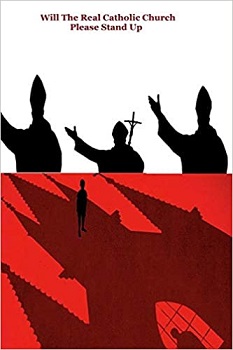

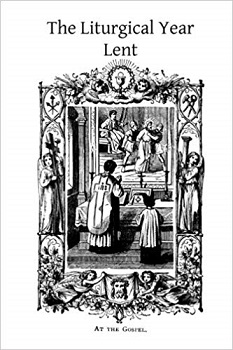
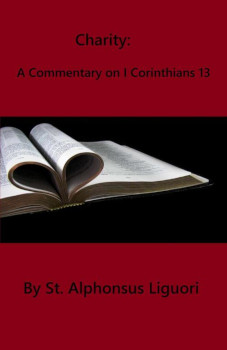










 Follow
Follow


